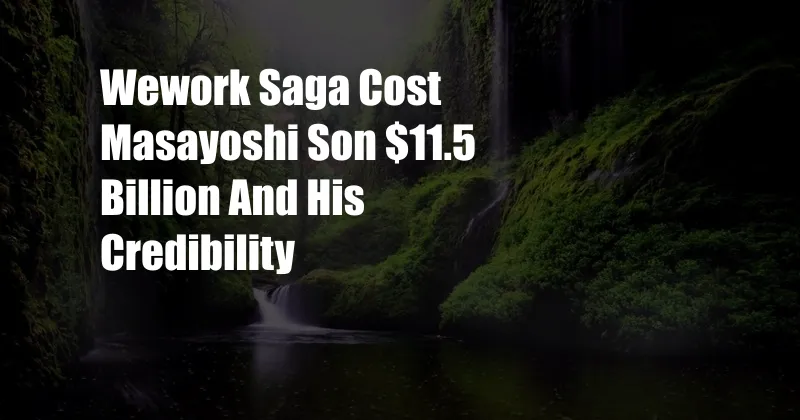
WeWork Saga: Costing Masayoshi Son $11.5 Billion and His Credibility
The WeWork debacle has sent shockwaves throughout the business world, leaving a trail of financial ruin and shattered reputations. Masayoshi Son, the founder and CEO of SoftBank, a Japanese multinational conglomerate, lost a staggering $11.5 billion in the company’s failed IPO. Beyond the financial loss, this debacle has cast a shadow over Son’s credibility as a visionary investor.
The WeWork failure has sparked a wider conversation about the risks associated with investing in high-growth startups, especially those with unconventional business models. This article delves into the saga of WeWork, exploring its rise, fall, and the profound impact it has had on Masayoshi Son and the venture capital landscape.
The Rise and Fall of WeWork
WeWork, a coworking space provider, was founded in 2010 by Adam Neumann. The company experienced explosive growth, riding the wave of the shared economy and the increasing popularity of remote work. At its peak valuation, WeWork was worth over $47 billion, making it one of the most valuable startups in the world.
However, the company’s rapid expansion was fueled by massive losses and questionable business practices. WeWork’s exorbitant leasing contracts and lavish spending drew scrutiny from investors. Neumann’s eccentric behavior and autocratic management style also raised red flags. Amidst mounting pressure, WeWork’s IPO in 2019 was a spectacular failure, and the company’s valuation plummeted.
Masayoshi Son’s Role
Masayoshi Son was a key player in the WeWork saga. SoftBank, under Son’s leadership, was an early investor in WeWork and became its largest shareholder. Son was a staunch supporter of Neumann, despite growing concerns about the company’s sustainability. He poured billions of dollars into WeWork, hoping to fuel its growth and secure SoftBank’s dominance in the tech industry.
Son’s unwavering belief in WeWork, despite red flags, has been widely criticized. The debacle has eroded his reputation as a shrewd investor and brought into question his ability to evaluate startup risks.
Impact on Venture Capital
The WeWork saga has had a ripple effect on the venture capital industry. Investors are becoming more cautious about investing in high-growth startups with unproven business models. The failure has also highlighted the importance of thorough due diligence and governance in startup investments.
Venture capitalists are now demanding more transparency, accountability, and realistic financial projections from startups before committing funds. The WeWork debacle has served as a cautionary tale, reminding investors that the pursuit of disruptive growth must be balanced with financial prudence.
Tips for Investors
In light of the WeWork experience, investors should exercise caution when evaluating high-growth startups. Here are some tips for minimizing risk:
- Conduct thorough due diligence: Scrutinize the startup’s financial statements, business plan, and market position.
- Assess the management team: Evaluate the experience, expertise, and integrity of the startup’s founders and executives.
- Understand the business model: Determine if the startup’s revenue streams and cost structure are sustainable long-term.
By following these guidelines, investors can increase their likelihood of identifying promising startups with a solid foundation for growth while mitigating the risks associated with high-growth businesses.
FAQs
- Why did WeWork fail?
WeWork failed due to unsustainable business practices, exorbitant leasing contracts, lavish spending, and leadership issues.
- How much money did Masayoshi Son lose in the WeWork debacle?
Masayoshi Son lost approximately $11.5 billion in the WeWork saga.
- What impact has the WeWork failure had on the venture capital industry?
The WeWork failure has made investors more cautious about investing in high-growth startups and has highlighted the importance of due diligence and governance.
Conclusion
The WeWork saga serves as a sobering reminder of the potential risks associated with investing in high-growth startups. Masayoshi Son’s experience is a cautionary tale for investors, highlighting the importance of balancing the pursuit of growth with financial prudence and sound business practices.
As the venture capital industry navigates the post-WeWork landscape, investors are advised to approach startups with increased scrutiny and a focus on fundamentals. By adhering to these principles, investors can enhance their chances of identifying and supporting successful startups while mitigating the risks of catastrophic losses.
Are you interested in learning more about the WeWork saga and its implications for the startup ecosystem?